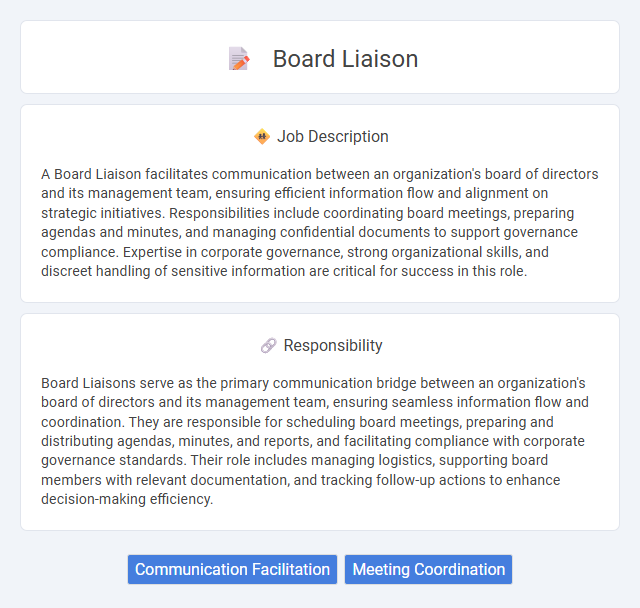
A Board Liaison facilitates communication between an organization's board of directors and its management team, ensuring efficient information flow and alignment on strategic initiatives. Responsibilities include coordinating board meetings, preparing agendas and minutes, and managing confidential documents to support governance compliance. Expertise in corporate governance, strong organizational skills, and discreet handling of sensitive information are critical for success in this role.
Individuals with strong organizational skills and effective communication abilities are likely to be suitable candidates for a Board Liaison position. Those who thrive in high-pressure environments and possess a keen attention to detail may adapt well to coordinating between board members and executives. Conversely, people who struggle with multitasking or maintaining confidentiality might find this role challenging.
Qualification
A Board Liaison typically requires a bachelor's degree in business administration, communications, or a related field, with several years of experience supporting executive teams or corporate boards. Strong organizational skills, excellent communication abilities, and proficiency in managing confidential information are essential qualifications. Familiarity with corporate governance, board meeting processes, and compliance regulations significantly enhances effectiveness in this role.
Responsibility
Board Liaisons serve as the primary communication bridge between an organization's board of directors and its management team, ensuring seamless information flow and coordination. They are responsible for scheduling board meetings, preparing and distributing agendas, minutes, and reports, and facilitating compliance with corporate governance standards. Their role includes managing logistics, supporting board members with relevant documentation, and tracking follow-up actions to enhance decision-making efficiency.
Benefit
Board Liaison roles likely enhance organizational communication, ensuring efficient coordination between board members and executive teams. This position probably improves decision-making processes by facilitating timely information flow and meeting preparation. Benefits may include increased transparency and stronger alignment of strategic goals across the company.
Challenge
The Board Liaison role likely involves managing complex communication between executive leadership and board members, requiring high-level organizational skills and discretion. Navigating conflicting priorities and sensitive information may frequently present challenges that test one's ability to maintain professionalism and accuracy. Handling urgent requests with limited time often demands adaptability and quick decision-making.
Career Advancement
A Board Liaison plays a crucial role in facilitating communication between a company's board of directors and executive leadership, ensuring seamless information flow and meeting coordination. Mastery in strategic communication, governance protocols, and stakeholder management accelerates career advancement, often leading to executive assistant or corporate governance positions. Building expertise in compliance, board operations, and confidential correspondence enhances leadership opportunities within corporate or nonprofit organizations.
Key Terms
Communication Facilitation
A Board Liaison ensures clear and effective communication between the board of directors and executive management, streamlining information flow to support strategic decision-making. They coordinate board meetings, prepare detailed agendas, and distribute critical reports to enhance transparency and engagement. Expertise in communication facilitation tools and stakeholder management is essential for maintaining alignment and fostering collaborative governance.
Meeting Coordination
Board Liaison professionals specialize in efficient meeting coordination, managing schedules, agendas, and materials to ensure seamless board interactions. They facilitate communication between board members and executives, optimizing the flow of information and supporting decision-making processes. Expert handling of logistics and documentation streamlines board meetings, enhancing organizational governance and productivity.
 kuljobs.com
kuljobs.com